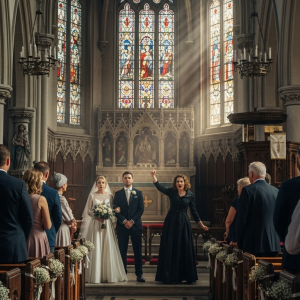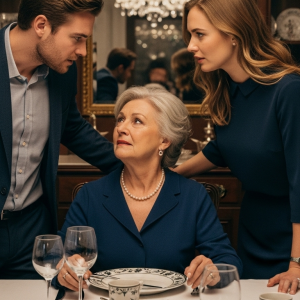In the controlled chaos of the trauma bay at Metropolitan General Hospital, Dr. David Chen was a god. Or perhaps more accurately, a machine. His movements were economical, his decisions instantaneous, his hands moving with a fluid precision that seemed to defy the brutal, bloody reality of his work. He could piece together a shattered femur or clamp a hemorrhaging artery with the same detached, focused calm. Colleagues admired him, residents feared him, and nurses respected him, but no one truly knew him.
The man he had been before—the laughing husband who loved to dance with his wife, Maria, in the kitchen, the doting father who taught his seven-year-old daughter, Lily, how to ride a bike—had died ten years ago on a rain-slicked stretch of highway. He had died in the passenger seat, the lone survivor of a wreck caused by a drunk driver in a speeding sports car.
The shell that remained was Dr. Chen, a man who had rebuilt himself around a hollow core of grief. He lived a life of monastic simplicity: a sterile, minimalist apartment, long shifts at the hospital, and quiet, solitary nights. The only break in his routine was his weekly visit to a quiet cemetery, where two granite headstones bore the names of his entire world.
A memory, sharp and unwelcome as a shard of glass, would often surface in those quiet moments. It was not of the crash itself, but of the courtroom months later. He remembered the face of the other driver, Thomas Thompson, a wealthy real estate developer with a smug, unconcerned expression. He remembered the slick, expensive lawyer who had argued a legal technicality about the blood alcohol test.
And he remembered the final, gut-wrenching moment when the judge dismissed the case, and Thomas Thompson had walked out of the courtroom a free man. Thompson hadn’t even looked at him. He had simply adjusted the knot of his silk tie in the reflection of the courthouse door and disappeared into a waiting limousine. There was no remorse, no apology. No justice. Just the quiet, grinding knowledge that money could wash away even the stain of blood.
The call came on a Tuesday night, deep into David’s 24-hour shift. A high-speed motorcycle accident on the interstate. The patient was a John Doe, no identification, arriving in profound shock with massive internal injuries. The ER was a whirlwind of controlled panic, the air thick with the smell of antiseptic and blood.
David entered the operating room, his mind already a step ahead, visualizing the damage, planning his approach. The OR was his sanctuary, the one place where the messy, unjust world outside could be held at bay by the clean, absolute laws of medicine and skill. “What have we got?” he asked, his voice calm and authoritative as he scrubbed in.
“John Doe, approximately fifty years old, multiple internal hemorrhages, spleen is likely ruptured, possible aortic tear,” the lead nurse, Helen, recited. She had worked with David for years and understood his rhythm better than anyone. “He’s unstable. We’re losing him.”
David moved to the operating table. The patient was a mess of blood and hastily applied bandages. The anesthesiologist was working furiously to stabilize his vitals. “Let’s get a clear view,” David commanded. “Suction.”
A nurse began to clean the blood and grime from the patient’s face and chest to prep for the incision. Under the brilliant, unforgiving glare of the surgical lamps, the patient’s features began to emerge. A strong jawline. A distinctive, thin scar above his right eyebrow. Hair that was more gray than he remembered, but the face… the face was the same.
It was the face from the courtroom. The face from his nightmares. It was Thomas Thompson.
For the first time in his professional career, Dr. David Chen froze. The world around him—the beeping monitors, the urgent voices of his team, the cold weight of the scalpel in his hand—receded into a dull, distant roar. All he could see was that face. The face of the man who had taken everything from him and paid no price. And now, that man’s life was in his hands.
Time seemed to warp and stretch in the silent, frozen moment. David stood over the body of his nemesis, the scalpel held perfectly still in his gloved hand. The machine had broken. Inside his mind, a decade of buried rage, of silent, screaming grief, erupted.
He sees Maria, laughing as she tries to get a smudge of flour off his nose. He sees Lily, her face a picture of pure joy as she rides her bike without training wheels for the first time. He sees the flashing red and blue lights, the twisted metal, the impossible, terrible silence where there should have been screams.
The power in his hand was absolute. All he had to do was nothing. Just wait. Let the man’s own broken body finish the job that a flawed justice system could not. Let him bleed out on the table. It would be so easy. A tragic, unavoidable loss. A karma that was ten years overdue.
The OR team felt the shift in the room’s atmosphere. The god-machine had faltered. The usual rhythm of the pre-op sequence was broken. Helen, the nurse, saw the look in his eyes, a terrifying, haunted stillness she had never seen before. “Doctor?” she asked, her voice a cautious whisper. “Dr. Chen, is everything alright?”
Her voice was the anchor that pulled him back from the abyss. He looked down at the patient, then at the scalpel in his hand. He remembered the oath he had taken, the solemn promise to consecrate his life to the service of humanity. He was not an executioner. He was a doctor. And this man, this monster, was his patient.
He took a single, deep, shuddering breath. The ghost of a husband and father receded, and the surgeon returned, his focus now narrowed to a terrifying, razor-sharp point. The internal battle was over. Professionalism had won. But the victory felt cold, and it had a new, harder edge.
“Nothing,” he said, his voice flat and metallic. “I’m fine. 10-blade scalpel. Let’s begin.”
He made the first incision, his hand as steady as if carved from stone. He worked with a cold, brutal efficiency that left his team breathless. He was not just performing a surgery; he was waging a war against the damage this man’s body had sustained. He navigated the landscape of shattered organs and torn vessels with a terrifying grace, his every move precise, perfect, and utterly devoid of emotion.
Halfway through the grueling procedure, the anesthesiologist’s voice cut through the tense quiet. “His pressure is dropping fast! He’s hemorrhaging faster than we can replace it! He’s going into DIC!”
“We need more blood, now!” David commanded, not looking up from his work.
Helen’s voice came back, tight with panic. “Blood bank is out of O-negative! We’ve used up the hospital’s entire emergency supply. We have nothing left!”
The announcement hung in the air, a death sentence. O-negative. The universal donor, but a rare blood type for a patient to have. There was no time to get more from another hospital. Thomas Thompson, who had survived the crash, who had survived the first hours on the operating table, was going to die from a simple matter of supply and demand. A grim, ironic justice was about to be served, whether David wanted it or not.
But David knew something the rest of his team didn’t. He knew his own blood type. He was O-negative.
In that moment, a new plan, a different kind of justice, far more profound and terrible than simply letting a man die, began to form in his mind. He straightened up from the operating table, his eyes locking with Helen’s.
“Get a transfusion kit,” he ordered, his voice ringing with an authority that left no room for argument. “Prep me. I’m the donor.”
Helen stared at him, aghast. “Doctor, that’s highly irregular! It’s against protocol! You can’t operate and…”
“I’m not asking you, Helen, I’m telling you,” David cut her off, his voice like ice. “This patient is not going to die on my table. Not today. Do it. Now.”
The team moved with a stunned, silent efficiency. A second gurney was wheeled in beside the operating table. While David continued to work on Thompson with one hand, a nurse prepped his other arm, inserting the thick needle of the transfusion line. The sight was surreal: the surgeon, a god in green scrubs, simultaneously operating on his patient while his own lifeblood, dark and rich, flowed through a clear tube, down into the body of the man who had destroyed his life.
The surgery continued. The fresh, direct supply of blood stabilized Thompson’s vitals. David, his own body weakening but his will absolute, closed the aortic tear and removed the shattered spleen. He had won. He had saved him.
As a resident began the final layers of sutures, David, still connected to his patient by the transfusion line, finally broke the long, tense silence. His voice was quiet, but it carried to every corner of the room.
“Helen,” he said, his gaze fixed on Thompson’s unconscious face. “When you’re writing the post-op report, I want you to make a special note in the chart. Note that the emergency blood transfusion was a direct donation from the attending surgeon. Note my name: Dr. David Chen.”
He paused, letting the weight of his words sink in.
“Then, I want you to call the police. Tell them your John Doe has been identified. His name is Thomas Thompson. Inform them that he is the man who, ten years ago, killed my wife, Maria Chen, and my daughter, Lily Chen, in a drunk driving incident. Tell them he walked free.”
He looked at the tube connecting his arm to his enemy, a grotesque, intimate umbilical cord.
“And then tell them this. Tell them that when Mr. Thompson wakes up, the very first thing he is to be told… is that the only reason he is alive is because my blood is flowing through his veins.”
The room was utterly silent, save for the rhythmic beep of the heart monitor. The surgical team, who had just witnessed one of the most incredible displays of medical skill in their careers, was now witnessing an act of justice so poetic, so exquisitely cruel, that it took their breath away. They stared at Dr. Chen, then at the unconscious patient, then at the tube connecting them, and finally understood.
This was not an act of forgiveness. It was a sentencing. David had not allowed Thomas Thompson to die and escape into the oblivion of nothingness. He had, instead, chained his enemy to life, and to him. He had created a prison not of steel bars, but of blood and conscience, a prison from which there could be no escape. Thompson had evaded the state’s justice, but he would now face a far more intimate and eternal damnation.
He would wake up every morning for the rest of his life knowing he owed his existence to the man whose life he had destroyed. Every beat of his heart would be a reminder of the family he had killed. He was no longer a free man who had gotten away with it; he was a living monument to his own crime, kept alive by a constant, flowing transfusion of his victim’s grief and rage.
Helen, her eyes wide with a mixture of horror and awe, could only nod. The legend of Dr. David Chen, the cold, brilliant machine, died in that room. And the legend of David Chen, the grieving husband who had crafted the perfect revenge, was born.
David did not stay to watch Thompson wake up. His work was done. He left the hospital, the slight lightheadedness from giving blood a dull, physical echo of the immense psychological weight that had just been lifted from his shoulders.
The story spread through the hospital like wildfire, a whispered piece of modern medical folklore. Thomas Thompson woke up two days later. A grim-faced police officer stood by his bed, and a nurse, following Dr. Chen’s orders to the letter, calmly and clearly explained to him the circumstances of his survival. The wealthy, arrogant man who had never faced a consequence in his life finally broke. His recovery was agonizing, haunted by a torment far worse than any physical pain. He would live, but his life was now a permanent, walking hell.
Several weeks later, on a clear, cool morning, David stood in the cemetery. The sun was warm on his face. He placed fresh flowers on the graves of his wife and daughter, his movements slow and gentle. For ten years, this place had been a sanctuary of pain, a weekly ritual of reliving his loss.
But today, something was different. The crushing weight that had settled on his soul a decade ago was gone. He had not violated his oath. He had saved a life, as he had sworn to do. But in saving his enemy, he had also saved himself. He had not sought vengeance in the form of death, but had delivered a reckoning in the form of life.
He looked at the names carved in the stone, and for the first time in a decade, a genuine, peaceful smile touched his lips. The war was over. He hadn’t gotten revenge. He had achieved victory. And in the quiet morning air, he finally felt the first, fragile stirring of peace.




